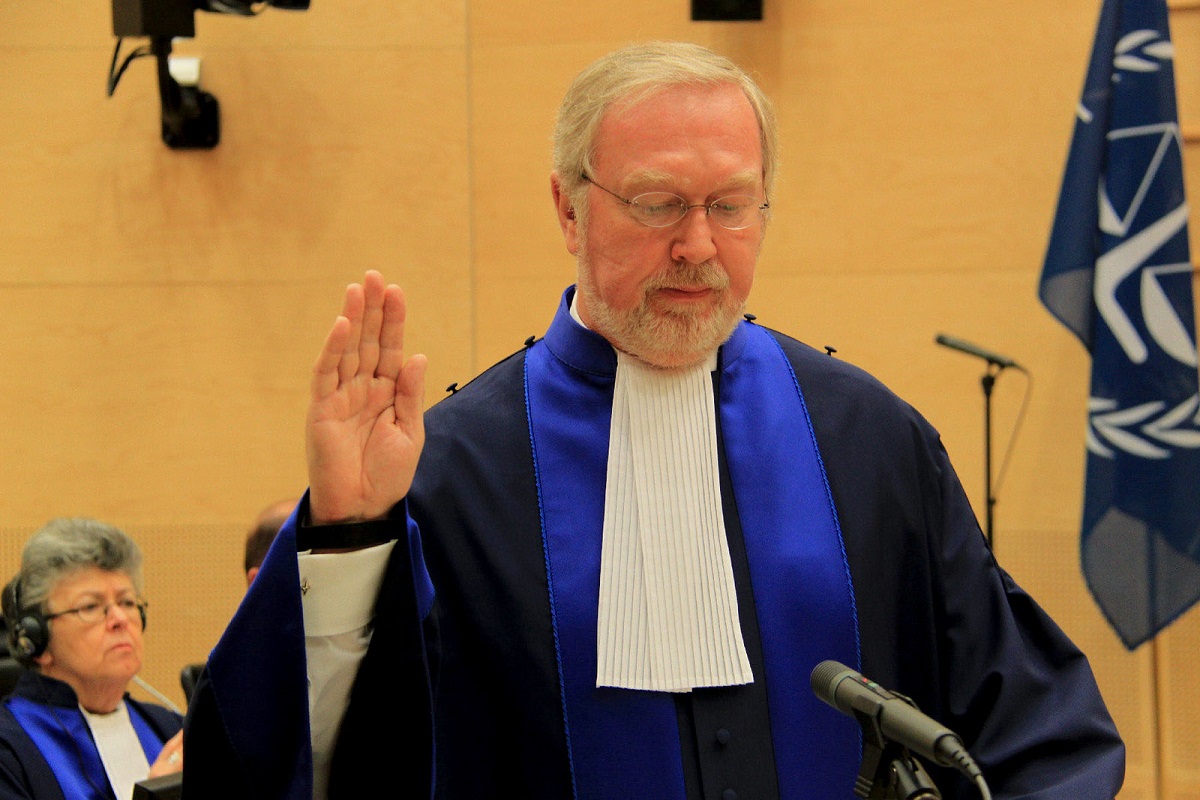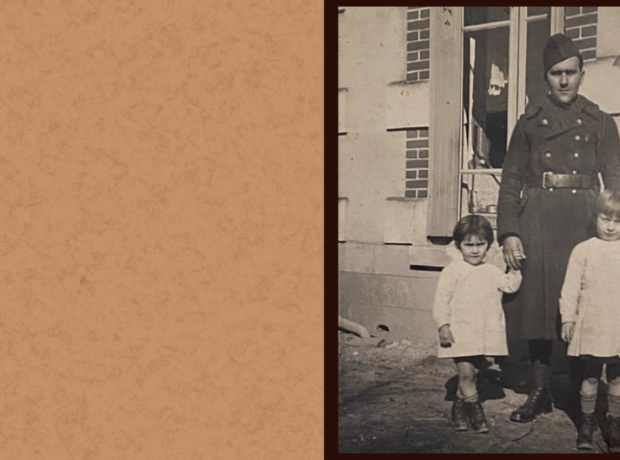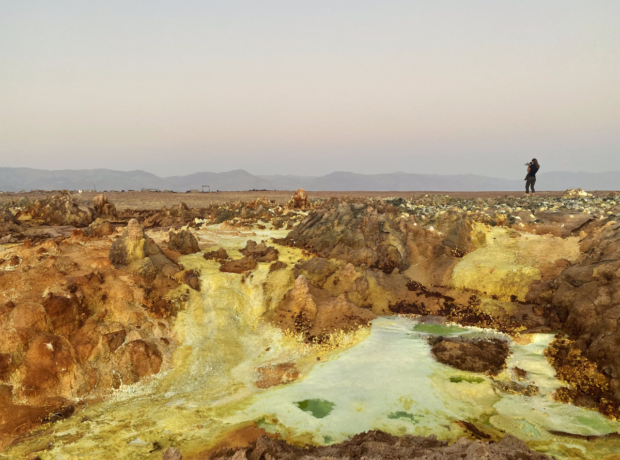After defending in war crimes tribunals for Rwanda and the former Yugoslavia, Howard Morrison QC went on to serve as trial judge in the case of former President of Bosnia, Radovan Karadžić, before being elected as one of six judges for the International Criminal Court. Here we ask how he’s dealt with the effects of the crimes he’s handled, whether Ecocide could become the fifth crime tried at the ICC, and what advice Judge Morrison has for today’s law students.
How did you get involved in international law?
When I first started at the Bar, I did crime, civil and family law. Many many years ago now, it must have been ‘98 or ‘99, there was a little advert in Counsel magazine which said, ‘do you want to put your name down on the list of defence counsel at the ICTY [International Criminal Tribunal for the former Yugoslavia]?’ I was always interested in international law. I’d read all about the Nuremberg trials and the Tokyo trials. I’d always been interested in history and military history. My father was in the air force for the whole of his working life.
And so I got myself on the list. I got communication from a Croat, in fact, who had been convicted and wanted a separate lawyer on appeal. It was in the Celebici trial, which was the first command responsibility trial since Nuremberg. I did four cases in total at the Yugoslav tribunal, and then I represented a Rwandan cabinet minister on charges of complicity and genocide.
Everything in terms of criminal defence, at the higher end of it, is down to reputation. People want you to defend them. It may be the rest of their life either in or out of prison.
I became QC, mainly prosecuting murder cases one after the other. Then I became a circuit judge in 2004. And then, in 2009, there was an advertisement for the creation of the Special Tribunal for Lebanon. I put my hat in the ring for that, was interviewed and selected. I only helped draft the rules and procedure, because shortly after, the British judge at the Yugoslav tribunal resigned and I was asked to replace him.
For me, it just happened. It was a door that opened, and I went through it.
How have you made your judgments?
It’s a sort of analytical process. Applying the law to the facts as you find them.
In an international trial, where you don’t have a jury, you’re always going to have at least three judges, and as soon as you have more than one judge, you have more than one view. You try to be unanimous, and behind the scenes, when you’re debating the verdict or the appeal process, you listen to each other’s arguments and try to find some commonality. Sometimes you can and sometimes you can’t.
Read more: Fighting for justice after the Rwanda genocide: An interview with prosecutor Charles Adeogun Phillips.
You seek to find common ground. People don’t dissent for the fun of it. They dissent because at the end of the day, intellectually they can’t agree. In the ICC, I was in the Appeals Division the whole time, where we sat as a bench of five, so it gets even more potentially complex. You’ve got five judges chipping in and it’s a majority decision. It wasn’t so much witness assessment – it was assessing how the trial or pretrial judges had assessed the witnesses and whether it stood up when you applied the law.
A lot of people criticise the ICC for not having a fully-developed catalogue of law. But the English common law is still developing, still changing. Law should do that. The whole point of the law is to reflect the societies in which and for whom it operates. You wouldn’t expect sentencing not to have changed over the years. In Victorian times, you could be hung for stealing a sheep! In the 1830s, nobody raised an eyebrow at that. Societies have become, by and large, more understanding and accommodating.
When society becomes more understanding and more accommodating, the law tends to follow.
Something like the Karadžić trial, in which I was involved for five years, is just evidence-based. Evidence comes in many forms: it’s in writing, it’s face-to-face, video, forensic, scientist evidence, maps, radio intercepts… There’s a plethora of source material. It’s all got to be analysed, looked at for its relevance, and given such weight as you can give it, or not, as the case may be.
How did you keep all of that evidence in any kind of order in your mind?
There’s no point in waiting until the end of the case and then sitting down and saying, “Right, I’ll now think about those 250,000 pages of evidence or those 500 witnesses”. You have to compartmentalise it as the case goes on.
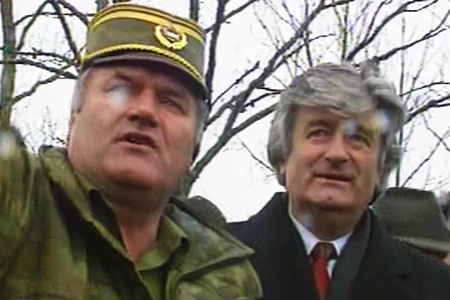
Serbian military and political leaders Radovan Karadzic and Ratko Mladic who were indicted for genocide in Srebrenica in July 1995 – from UN ICTY.
In Karadžić, we used to have regular meetings of the trial judges about the evidence we’d heard that week, and we would make preliminary assessments. They are by no means final assessments. They can’t be and mustn’t be, as you may hear evidence later that contradicts or casts doubt upon them.
You have to start accumulating pieces of the jigsaw puzzle even if you’re not actually building the jigsaw. You have to have some concept of where they might go.
Are there any cases you’ve been involved with that you feel could have or should have gone differently?
It’s on the public record: the Lukić trial. When I was a trial judge in Karadžić, they needed to have another judge in the Lukić case, so I was shifted up to the Court of Appeal. I wrote the one dissenting judgment. Four judges upheld the conviction of one of the Lukić brothers and I was bewildered as to how and why they did so and I said so in fairly strong terms. I think I said I found it unfathomable.
- Never before has hearsay evidence with so little by way of substantive indicia of reliability been accepted as reliable, and the Majority’s conclusion, as well as its failure to explain its significant divergence from historic jurisprudence in this regard, is, with respect, unfathomable.
There are cases where you think, how could they have come to that conclusion? However you look at the evidence, it cannot support that conclusion.
For me, in the Lukić case, it couldn’t go either way. First of all, the Trial Chamber had not even recognised that some of the evidence they were dealing with was hearsay evidence, and didn’t give that the necessary caution. Secondly, there were perfectly good grounds for thinking that some of the identification evidence was so dangerous that you shouldn’t rely upon it. But that was my view. I may have been wrong. I don’t think I was.
How have you managed the emotional impact of the cases you have dealt with?
Somebody once said to me, you’ve spent 20 years staring either literally or metaphorically into mass graves. That’s got to leave an impact. And it does.
What you try and do is to put it into perspective. If you start to get emotional about evidence – and sometimes it’s hard not to – then that might have a prejudicial effect against the accused, so you’ve really got to back off from that.
You can have a witness who tells you the most horrendous stories, but in fact it doesn’t implicate the accused. It’s true, what happened to them, but it’s not necessarily true that the accused is responsible. You have to make that distinction.
Read more: So you want to be a Legal Aid lawyer?
Everybody who comes to court in those circumstances wants to be believed and wants the accused person to be found culpable. But as a judge, you have this enormous dispassionate sifting process in front of you, and however horrendous the evidence was, you’ve still got to find a causal connection between the evidence and the culpability of the accused.
What is your advice for law students today?
It’s more competitive now. Get the best degree you can. If you have the opportunity to do a Masters degree in the discipline you want, do it.
The other thing I’d say is that if you get an opportunity to do something different, even if it takes you out of your comfort zone, do it. If you don’t try it, you’ll never know.
Can it be intimidating to be a judge with enormous political pressures around you?
You leave it at the court door. It would be naïve to suppose that politics doesn’t play an enormous part in, first of all, the causation of offences – but you stop the politics at the court door, and if the judges aren’t capable of doing that, they should seek alternative employment, because there’s no place for it in the court. The court should deal solely with the evidence and the law that is applicable.
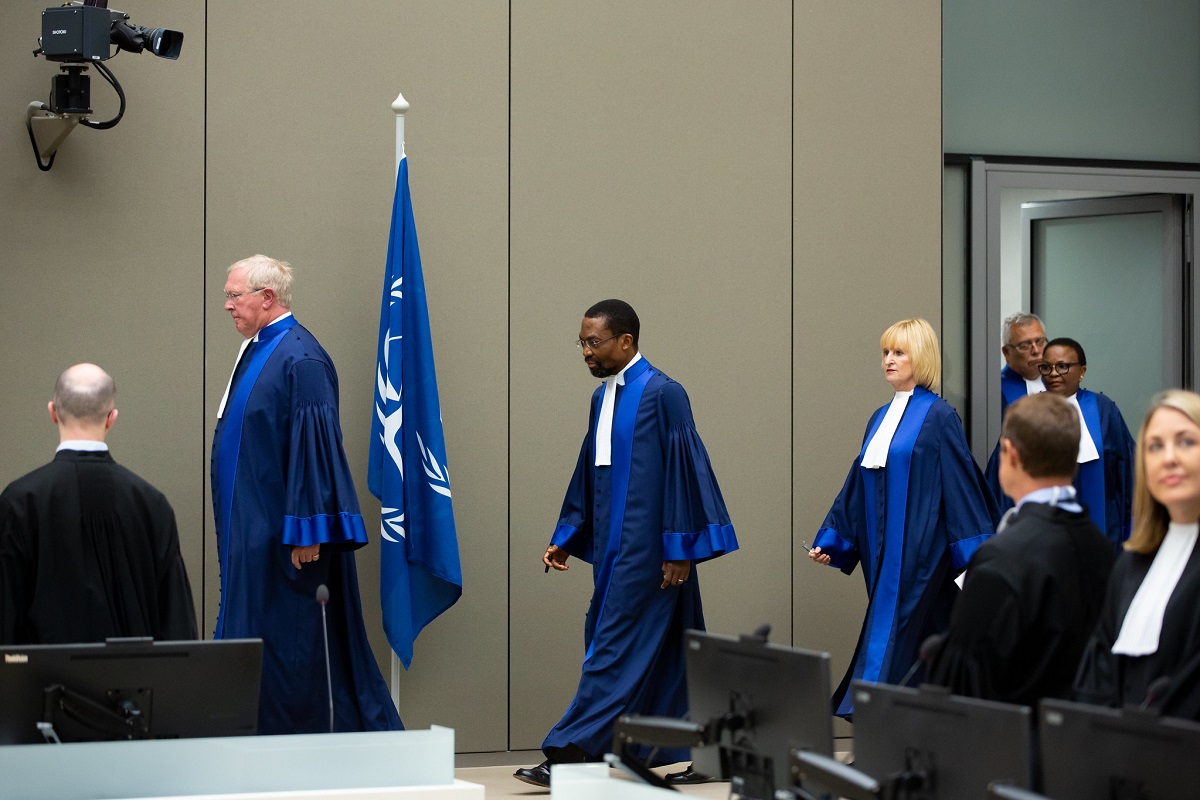
Judge Howard Morrison enters a courtroom at the International Criminal Court – © ICC-CPI
You’re going to be criticised one way or the other. When I first started in the law, my Pupil Master said to me very accurately, ‘it doesn’t matter whether you’re prosecuting, defending or judging – if you can get 50% of the people to think you’ve done the right thing, you’ve done well.’
If you’re prosecuting a case, everyone who thinks he’s guilty is on your side, everyone who thinks he’s innocent is against you, and vice versa. If you pass a sentence as a judge, perhaps a third will think you’ve got it right, a third too lenient, and a third will think you’ve got it too… savage.
The law is not a perfect or exact science. What you need to do is make it as fair as human wit can engender.
What makes you angry?
Corruption. Nothing will make me viscerally angry because you control your emotions. But the things that make me angry are the same things that make you angry: manifest injustice and things of that nature.
And the sort of blatant dishonesty that goes on in some political spheres, particularly in the populist ones. If you listen to some of the things some populist politicians say, which are so incredibly stupid and obviously wrong, you think, how can anybody who claims to have a modicum of human intelligence do and say those things? That’s extra disappointing when it affects you, or your friends, or your family.
In court, it makes me angry if you get counsel who persist in pursuing obviously bad points.
Can you tell me more about your work as defence counsel?
There are so many misconceptions about the role. First of all, you do not have to believe your client. You don’t have to be personally convinced of their innocence, but it helps if you are. The requirement is that you make sure that your client’s case is delivered in the best way possible, for the maximum effect, within the rules.
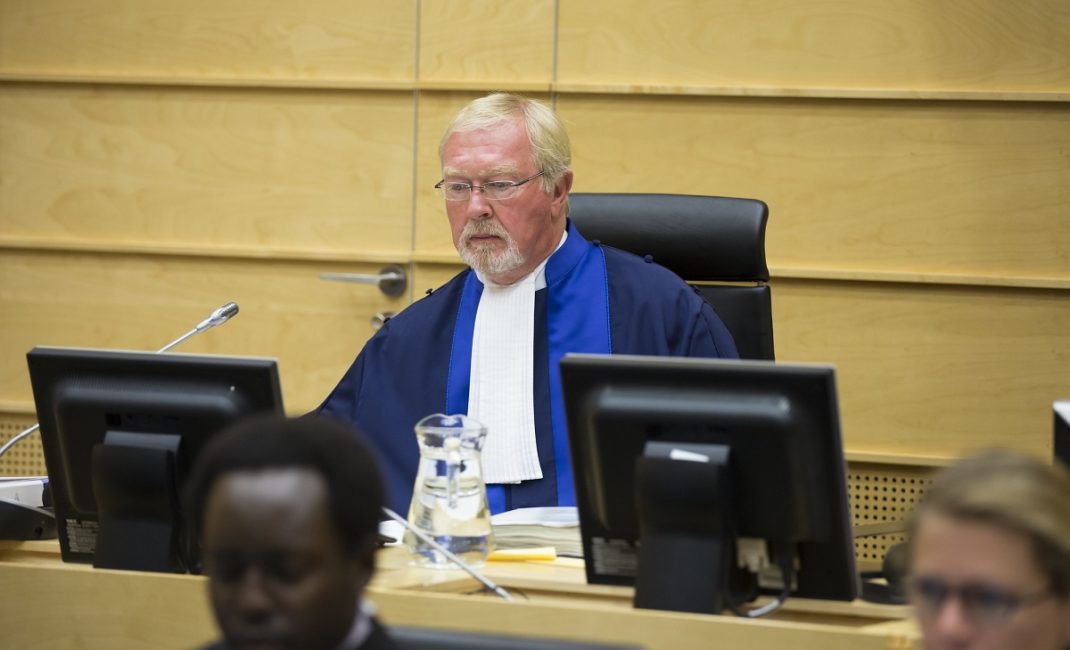
Judge Howard Morrison at The Hague during a hearing for review concerning reduction of sentence of Mr Thomas Lubanga Dyilo in 2015 – © ICC-CPI
The same with the prosecution. A proper prosecution is one that doesn’t want a conviction at any cost. It’s a conviction which is based upon a fair consideration of relevant and admissible evidence.
A fair trial may result in a conviction or an acquittal. It can be fair in both circumstances.
Do you get to know the people you defend?
That’s inevitable. If you’re defending someone in an international case, you’re likely to be with them for months, if not years. You inevitably develop more of a relationship with a client than you would in a domestic case, simply because you’re spending far more time with them, and you’re having to deal with what are sometimes very personal, emotional, difficult allegations against them.
How do you guide them through the process?
First of all, it’s vital that your client understands the case that he or she has to meet. And second, you can give them advice and say, “These are your instructions and I’ll put your instructions, but I must warn you that they are not going to assist you in the best way possible.”
What’s perfectly fair – it’s happened to me in domestic trials – is that you say, “well, actually, Mr. Smith, what you’ve just told me means that you are in fact guilty of this offence. You’ve admitted the central ingredients of the offence, so I can only now continue to represent you if you plead guilty. If you don’t want to proceed on that basis, we’ll have to part company and you’re going to have to get another counsel, but let me warn you, if you tell him or her what you’ve told me, you’re going to get exactly the same answer.”
In those circumstances, 90 out of 100 defendants will say, “OK, in that case, I accept that I’m guilty.”
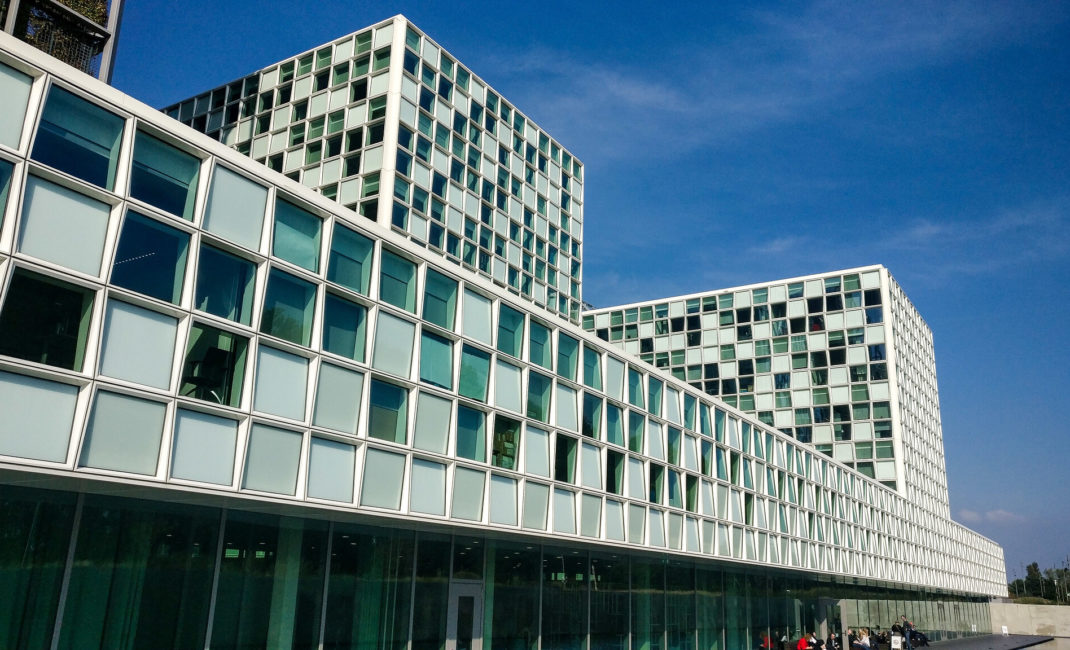
External view of the International Criminal Court at The Hague – by jbdodane
It’s in everybody’s interest, if it’s fair and equitable to do so, to avoid a trial.
First of all, it saves witness and victims from having to relive their experiences in court. Secondly, it means the client can get proper credit for a plea of guilty when it comes to sentence. Thirdly, and more venally, international trials are so long and expensive. You’re actually saving huge amounts of public money.
How cost-effective is the ICC?
All international trials are by their very nature complicated and long. You can’t have a genocide trial which lasts a week. The evidence is going to be extensive.
When you say “cost-effective” – some people say a trial is only cost-effective if at the end of the day someone is found guilty. People have said that about the ICC. I think it’s a totally misplaced view. What matters is, at the end of the case, whether or not they were convicted or acquitted, would an observer on the sidelines say, “I don’t necessarily agree with the verdict, but it was a fair trial”?
If, at the end of the day, it’s a fair trial, then it’s cost-effective.
Justice must not only be done, it must be seen to be done?
It’s called the golden rule. You don’t have a Stalinist show trial, but neither do you have a trial behind closed doors. In a criminal trial, it’s very important that you have a public gallery, so there’s absolutely no doubt as to what went on.
Do you see it as symbolism, to hold individuals responsible for massive crimes?
I don’t see it as symbolism. I see it as that it’s important to emphasise that there is no impunity and no immunity any more in international law. It doesn’t matter howsoever high you are in society. If you commit egregious offences, you’re going to be held accountable for them.
Now this concept started powerfully at Nuremberg and in the Tokyo tribunals, and if Hitler had stayed alive there is no doubt that he would have been indicted, and being head of state would have been no defence. It’s no defence at the ICC or the ICTY or the ICTR.
Immunities, both official and personal, I think, should be consigned to the history bin.
You’re either culpable because you’ve committed a crime or you’re not, and your position shouldn’t protect you from culpability if you have in fact committed a crime.
What about Dominic Ongwen, a former child soldier and later a commander in the Lord’s Resistance Army, recently prosecuted at the ICC. Was he the one to prosecute?
You’re not always dealing with the people who are right at the top, but sometimes there’s been a very egregious crime and you can’t lay a finger on the people right at a top, but you can lay a finger on the person one or two steps down the chain of command. If there is relevant and admissible evidence and you are going to get some satisfaction for the victims, then it’s perfectly proper to take that case.
That’s actually how the ICTY started – not by prosecuting Karadžić, Mladić, or Milošević. It started by prosecuting prison camp guards and commanders. It had to start somewhere. And the easiest people to bring before the court, against whom there was direct evidence, were the readily identifiable ones, without any real problem of linkage with the offences. If you had a prison camp guard who was notorious for raping female detainees and beating up male ones, that’s a relatively easy target and deserving of prosecution.
What would you say to the allegation that the number of African cases brought before the ICC undermines the ICC’s legitimacy?
The short answer is: no. Of the first eight cases at the ICC, which all involved Africa, five were self-referrals. They came from the countries themselves. They said to the ICC, ‘please take these cases.’ Of the remaining three, two cases were referred by UN Security Council – that’s Libya and Darfur. Again, it wasn’t the ICC going after those cases. It was the Security Council referring them to the court – which, incidentally, includes Russia, China, and America, who are quite happy to recognise the court de jure and de facto when it suits them to do so.
Read more: A tiny West Bank village is due to be demolished: here’s how international law could be used to intervene.
The remaining case in that scenario was Kenya, and what Kenya said was, ‘under the complementarity provisions of the Rome Statute, we will investigate this case ourselves.’ They were given ample opportunity to set up a commission and afterwards, if necessary, to prosecute. After the then prosecutor at the ICC simply lost any confidence that they were going to do it, he initiated the prosecution.
You go to the court building – you just see how many African people are either judges or prosecutors or defence counsel or simply working in the court in the staff.
It’s as nonsensical to describe the International Criminal Court as anti-African as it is for Trump to describe it as anti-American.
Could International Criminal Law include a crime of ecocide?
I’m all in favour of it, if it can happen. But to put a fifth offence into the matrix of the ICC means a major change to the Rome Statute, which means, I think, you have to get 75% of the countries to vote for it. That’s going to be hard.
It may happen, because at the moment environment and ecology are in the ascendancy in the minds and philosophy of a lot of people. But I’ve always said, and I maintain it, that if an environmental offence is egregious enough to affect a large number of people, then why not prosecute it as a crime against humanity, which is already on the statute book of the ICC?
I don’t see why an inventive prosecutor could not make out a perfectly proper case, if enough people are egregiously affected. The category of crimes against humanity is never closed.
You could just say, ‘this deforestation not only destroyed the natural environment. It destroyed the livelihood of 20,000 people, half of whom have now died through hostile acts by the loggers or the logging companies, or by imported diseases… If that is not a crime against humanity, what is?’ Indicted as such.
Your problem then is going to be identifying the principle perpetrator, and you may then have to go after the CEO of, for instance, a logging company, on the basis of superior responsibility, knowing that what he did – and it’s usually a he – was inevitably going to lead to the sort of egregious consequences that actually happened. Or that he was being reckless as to whether or not 20,000 people died.
I’m not pretending to have great prescience. I’ve been saying this for ten years. But I am very pleased that ecocide has now got onto the agenda. I’m just a bit cautious about clapping too loudly about it because it’s a hard road.
What makes a good examination-in-chief? A good cross-examination?
Following the rules. A good examination-in-chief is one where you only ask open questions. And a cross examination is where you basically only asked closed questions. Within that, there’s a huge range of abilities and skills.
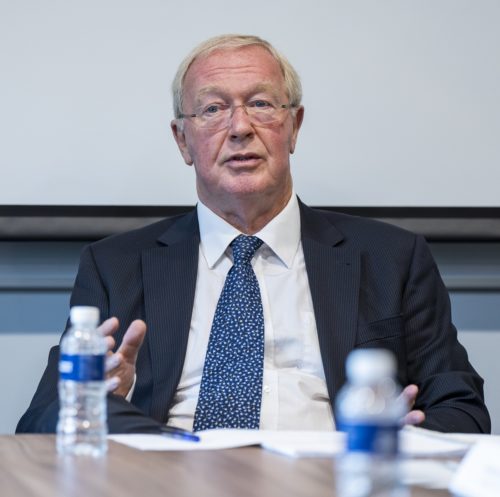
Judge Howard Morrison QC at the 2018 Singapore Management University School of Law. Photo by Chensiyuan.
It always disappoints me when somebody in ICC asks an obvious leading question in an examination-in-chief. They’ve only done it because they can’t think how to get that answer out without doing so.
There are very few born advocates. You learn advocacy. The more you do, the better you get, as long as you’re brought up short when you make mistakes, and we all make mistakes and we all have to learn from them.
You assess the witness, the vulnerability of the witness. And there are some witnesses who are either patently so nervous in the witness box that there is a real danger that they will be either easily persuaded to say something which is wrong, or simply clam up altogether. So you’ve got to be very cautious. You’ve got to lead witnesses into it gently.
As a lawyer, your job is not to bully or intimidate people – your job is to try and extract the truth as you are instructed that it is. You can’t be diffident about it. It’s somebody’s life on the line. If you’re prosecuting, you want to get the evidence out in a meaningful, believable way.
It’s funny – until the advent of DNA, the usual defence to rape was: it wasn’t me, I didn’t do it. After DNA came out, that defence rather went out the window. And it was always consent after that. That may be a slightly cynical view, but you saw that paradigm shift in defences, in not just rape but in other cases where identity was established through DNA. It was always: I wasn’t there, I didn’t do it. Then it was: I was there, I didn’t do it, or, you’ve misinterpreted it.
Everyone’s stories had to change?
Absolutely. Not only is DNA a great investigative tool, both for the prosecution and defence, because it can exonerate as well as implicate someone, but it has changed the nature of how people who are in fact guilty have approached challenging the evidence against them.
So would you try to construct a narrative for the jury?
Yes. Tell the jury a story. For the prosecution, tell them a logical story that is supportable on the evidence that you are going to call. And it’s the same for the defence. Tell the jury a story which is compatible with your client’s instructions. In simple terms, everybody likes a story.
- Judge Howard Morrison QC has been appointed an Honorary Professor at Warwick Law School where he will be teaching on the school’s undergraduate and postgraduate International Criminal Law modules.
Main image shows Judge Howard Morrison being sworn in at the International Criminal Court – © ICC-CPI.
Read more:
